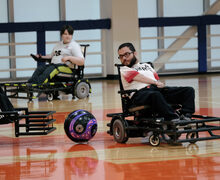PRSSA’s all-female executive board wants to boost inclusivity in PR
Wendy Wang | Staff Photographer
The 11-member PRSSA executive board for the 2020-21 year is made up of all women.
Get the latest Syracuse news delivered right to your inbox.
Subscribe to our newsletter here.
During Sara Caywood’s sophomore year, a former president of the Public Relations Student Society of America encouraged her to take on a leadership role in the Syracuse University chapter – as the vice president of events.
Despite considering herself a shy person, the position pushed Caywood out of her comfort zone by forcing her to meet people and lead PRSSA members. It also led her to take on the co-president position this academic year so she can mentor and encourage newer members to explore leadership positions in the public relations industry, she said.
“(The former president) saw something in me that I didn’t see in myself,” Caywood said. “I think that PRSSA has inspired me to lead by helping people see things that they can’t see in themselves.”
PRSSA is a national organization that teaches students public relations skills that they wouldn’t learn in the classroom and gives them opportunities to network with professionals in the industry.
SU’s 11-member executive board for the 2020-21 year is made up of all women. Samantha Cooper, a senior and co-president of PRSSA, said this is significant because she won’t see this amount of female leadership in the public relations industry after she graduates, since white men dominate most leadership positions in the field.
As of 2018, women occupy nearly 75% of jobs in the PR industry, but only 30% run global PR firms, according to the Bureau of Labor Statistics. Women occupy only one in five senior positions.
“We have reached a point where that conversation is being had, and then the next step is to make real actionable changes to make sure that that structure doesn’t continue,” Cooper said.
One cause of the gender disparity in the public relations field, Cooper said, is the phenomenon called “the glass escalator,” which is the idea that it’s easier for men to rise up in female-dominated professions due gender stereotypes and patriarchal structures in the workplace.
Having an all-female executive board is something she hopes will be beneficial for connecting to female club members and teaching them the necessary skills to prepare them for leadership positions in the industry.
Karley Warden, a senior and PRSSA’s vice president of professional development, is happy to have an all-female executive board because it has helped her gain the confidence necessary to be a leader.
Still, the focus of the executive board is to recognize issues of intersectionality in PRSSA. This includes making members of all races, ethnicities and identities feel more included and represented.
A lack of representation can be seen in the PR industry, as Black people occupy only 8.3% of jobs in the industry and Hispanic or Latinx people make up 5.7%, according to the Harvard Business Review.
“It’s certainly really great to have an all female executive board, but we need to ensure that we’re not just thinking about our gender identity, but we’re thinking about the minorities that we’re reaching in our community,” Warden said.
One step the board took to improve diversity and inclusion in PRSSA is the addition of an eleventh board member, the vice president of diversity and inclusion.
PRSSA hired Kiana Khoshnoud, a sophomore PR student, to take the position on Friday. Her goal with the role is to make diversity an essential part of the program and a major component in all initiatives.
Khoshnoud, who is a daughter of immigrants from Iran and a person of color, said a few people at SU have said something ignorant to her without realizing it. She hopes the position will make people of marginalized communities feel better represented and will educate members on ignorant remarks.
The position will create a long-term plan for diversity and inclusion within the chapter, run at least one event centered around this topic for chapter members each academic year and partner with various campus organizations, Caywood said.
“I think that it was a little disheartening that it’s 2021 and this position never existed before,” Caywood said. “And we’re taking the necessary steps to push forward and to make the change in our executive team where we see it.”
Other ways the board is focusing on inclusivity in the organization is by holding focus groups, or open-ended discussions with a randomly selected group of members. Last month’s discussion went for over an hour, and members were very open to giving feedback, Caywood said.
Warden, who organizes events for the chapter, has invited speakers of color and other identities to give advice to members of the organization. By inviting these speakers, Warden said she’s trying to make all members, especially those of marginalized communities, feel represented and empowered to take on positions they want in the PR industry.
One of last semester’s speakers included Oladotun Idowu, an SU alumna who founded Sisters in Media, an organization that aims to increase the presence of women of color in entertainment.
Warden said that her generation is demanding to hear more voices in the media, but PR representatives need to connect with the public in some way to build trust.
“If we don’t have a representative industry of public relations professionals who are diverse in race, ethnicity, gender, identity, background, sexuality, then how are we going to expect our consumers and our constituents to believe that what we’re saying is true? Or that what we’re saying is right?” Warden said.
Neeve Prendergast, a senior and the co-director of EDGE — a PRSSA program at SU for first-and second-year students — said that it’s important to address inclusivity in the PR industry because professionals need to represent their audience to form a connection with them.
PR is very influential on public opinion and has the power to make the public think about inclusivity in everyday life, she said.
“At the end of the day, we’re putting out campaigns and putting out these communication efforts,” Prendergast said. “And if we don’t include diverse and inclusive perspectives, and if they don’t have a seat at the table, then we can’t really progress forward.”
Published on March 7, 2021 at 11:39 pm
Contact Abby: [email protected] | @abbyweiss_21





